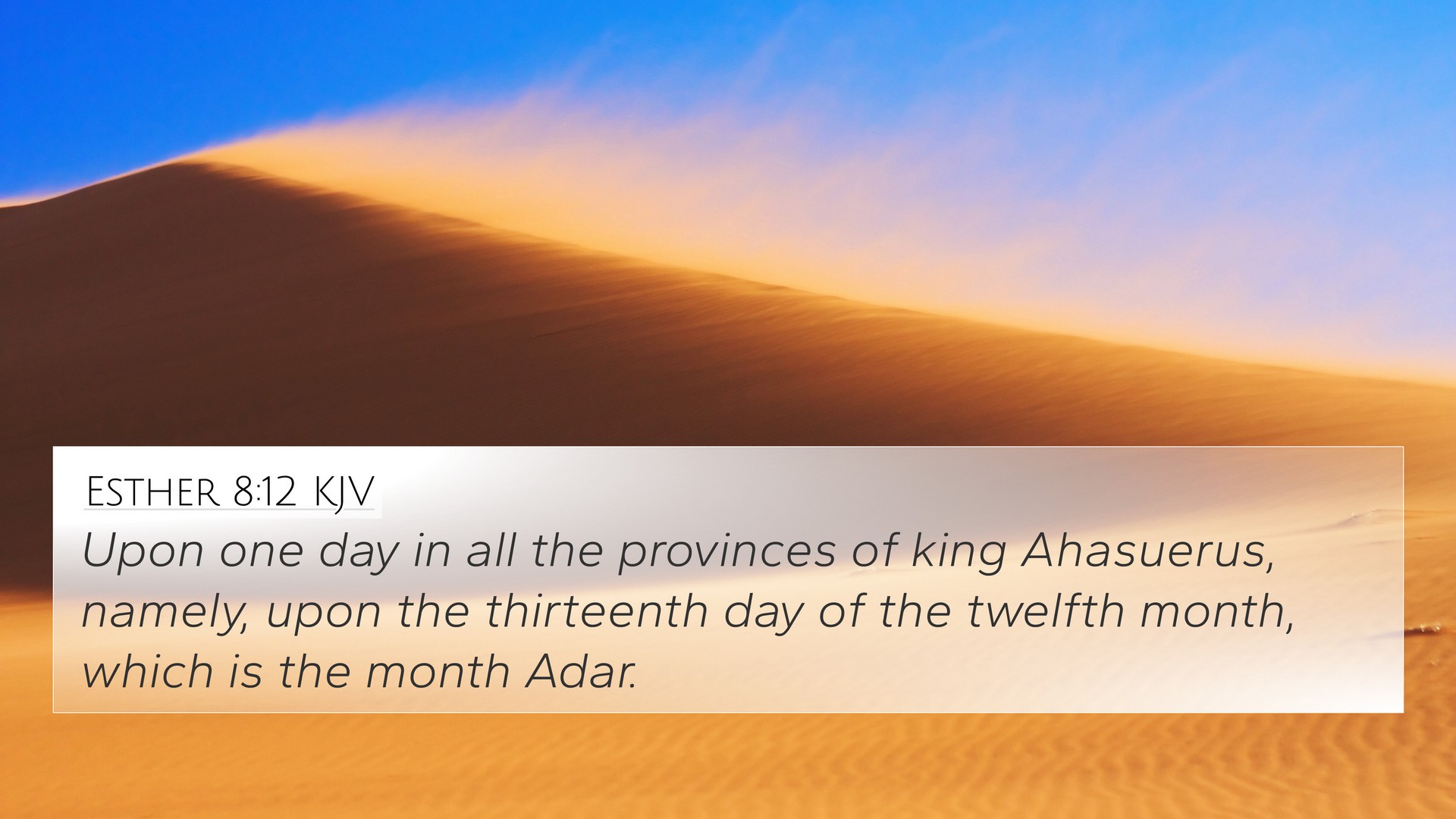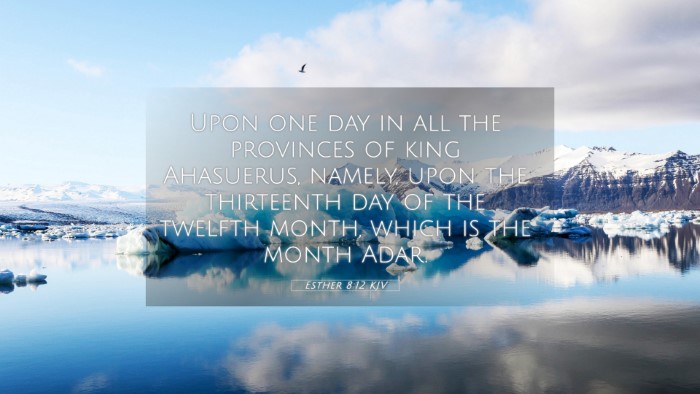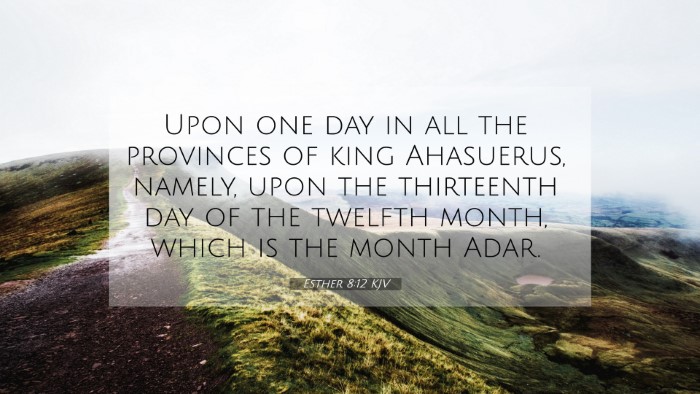Old Testament
Genesis Exodus Leviticus Numbers Deuteronomy Joshua Judges Ruth 1 Samuel 2 Samuel 1 Kings 2 Kings 1 Chronicles 2 Chronicles Ezra Nehemiah Esther Job Psalms Proverbs Ecclesiastes Song of Solomon Isaiah Jeremiah Lamentations Ezekiel Daniel Hosea Joel Amos Obadiah Jonah Micah Nahum Habakkuk Zephaniah Haggai Zechariah MalachiEsther 8:12 Similar Verses
Esther 8:12 Cross References
Upon one day in all the provinces of king Ahasuerus, namely, upon the thirteenth day of the twelfth month, which is the month Adar.
Uncover the Rich Themes and Topics of This Bible Verse
Listed below are the Bible themes associated with Esther 8:12. We invite you to explore each theme to gain deeper insights into the Scriptures.
Esther 8:12 Cross Reference Verses
This section features a detailed cross-reference designed to enrich your understanding of the Scriptures. Below, you will find carefully selected verses that echo the themes and teachings related to Esther 8:12 KJV. Click on any image to explore detailed analyses of related Bible verses and uncover deeper theological insights.
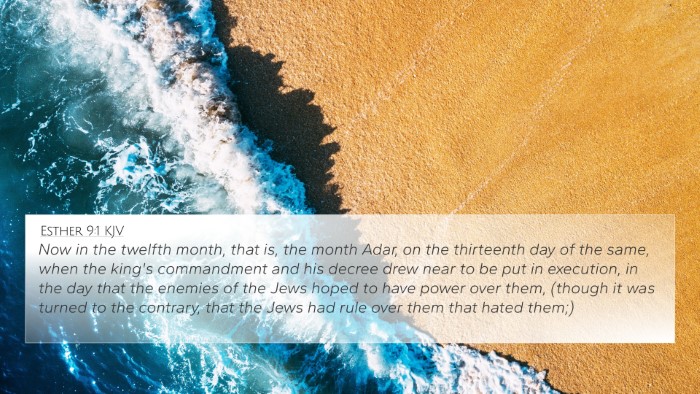
Esther 9:1 (KJV) »
Now in the twelfth month, that is, the month Adar, on the thirteenth day of the same, when the king's commandment and his decree drew near to be put in execution, in the day that the enemies of the Jews hoped to have power over them, (though it was turned to the contrary, that the Jews had rule over them that hated them;)
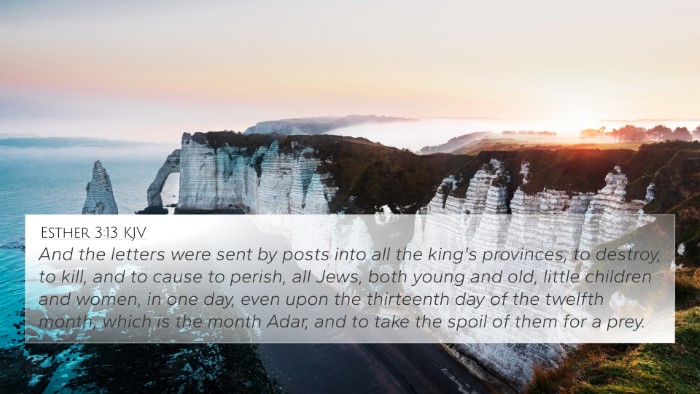
Esther 3:13 (KJV) »
And the letters were sent by posts into all the king's provinces, to destroy, to kill, and to cause to perish, all Jews, both young and old, little children and women, in one day, even upon the thirteenth day of the twelfth month, which is the month Adar, and to take the spoil of them for a prey.

Exodus 15:9 (KJV) »
The enemy said, I will pursue, I will overtake, I will divide the spoil; my lust shall be satisfied upon them; I will draw my sword, my hand shall destroy them.
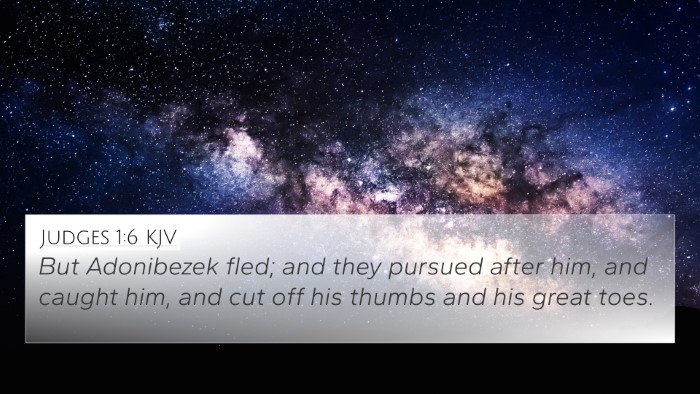
Judges 1:6 (KJV) »
But Adonibezek fled; and they pursued after him, and caught him, and cut off his thumbs and his great toes.
Esther 8:12 Verse Analysis and Similar Verses
Understanding Esther 8:12
Esther 8:12 states: "Upon one day in all the provinces of King Ahasuerus, namely, upon the thirteenth day of the twelfth month, which is the month Adar." This verse is part of the narrative that reveals God's providential hand in the events surrounding the Jewish people's deliverance through Esther's courageous intervention.
Commentary Insights
This verse provides critical context for understanding the fate of the Jewish people during a pivotal moment in their history. Below are analyses from various public domain commentaries:
- Matthew Henry emphasizes how this appointed day was a key moment of deliverance for the Jews. Henry highlights that God's timing is perfect and that the events leading to this day demonstrate divine sovereignty, where all adversities were turned into opportunities for salvation.
- Albert Barnes notes that this date was significant as the time when the Jews were granted the right to defend themselves against their enemies. He explains that the day marked a reversal of fortune, turning a day of expected devastation into one of victory. This exemplifies the overarching biblical theme of hope and redemption.
- Adam Clarke provides insight on the significance of the month Adar, which corresponds to February/March on the Gregorian calendar. Clarke discusses how this timing amplifies the miraculous nature of the events, suggesting it as a time of renewal and divine intervention.
Importance of Cross-Referencing
The thematic connections to Esther 8:12 encompass various other scriptures that enhance our understanding of this event. Cross-referencing allows readers to grasp the full narrative and theological implications.
Bible Verse Cross-References
- Esther 3:13 - Details the decree to annihilate the Jews, establishing the backdrop for Esther's courageous intervention.
- Esther 9:1-2 - Discusses the outcome of the conflict on the day appointed, showing God's faithfulness to His people.
- Psalms 30:5 - "Weeping may endure for a night, but joy comes in the morning," reflecting the theme of deliverance from despair.
- Isaiah 41:10 - "Fear not, for I am with you," reinforces the assurance of God’s presence in times of danger.
- Romans 8:31 - "If God is for us, who can be against us?" encapsulates the idea of divine protection seen in Esther's story.
- Hebrews 11:6 - Discusses the importance of faith, as Esther's actions were rooted in her faith in God’s plan.
- Matthew 5:11 - "Blessed are you when people insult you...," connects to the persecution faced by the Jews.
Connecting Themes Through Cross-Referencing
The connections between Esther 8:12 and these referenced scriptures create a rich dialogue about divine providence, faith, and the reversal of fate. The act of linking Bible scriptures through comparative analysis reveals the intricate tapestry of God's redemptive plan across the ages.
Tools for Bible Cross-Referencing
Utilizing tools for cross-referencing can greatly enhance your study of Biblical texts. Here are some helpful resources:
- Bible concordance
- Cross-reference Bible study guides
- Bible reference resources to locate themes
- Comprehensive cross-reference materials for deeper study
Conclusion
In summary, Esther 8:12 serves as a critical juncture in the narrative of Esther, emphasizing God's providence and the triumph of faith over despair. By studying this verse in conjunction with its cross-references, readers can gain profound insights into the themes of redemption and divine assistance seen throughout the Bible. Engaging in comparative Bible verse analysis not only deepens understanding but also strengthens the believer's faith in God's ultimate plan.
